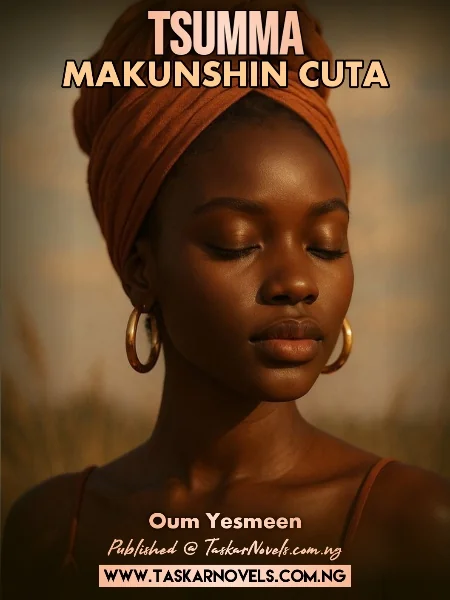
Tsumma Makunshin's Cuta (translated loosely as "Then the Shadow of Illness" or "Ultimately the Shade of Sickness") is a poignant Hausa family drama novel by Oum Yesmeen, a rising voice in contemporary Hausa literature known for her evocative portrayals of everyday struggles, sibling bonds, and the quiet burdens of caregiving. Published as part of the vibrant self-published scene on platforms like Wattpad and Facebook groups, the story weaves a tapestry of resilience amid poverty, unrequited affections, and the encroaching specter of illness in a modest urban household. With its raw, dialogue-heavy style, the novel captures the rhythms of Hausa life— from the bustle of school routines to the tender aches of unspoken love—while subtly critiquing societal expectations around gender, education, and familial duty.
The narrative centers on Areej, a vulnerable young girl on the cusp of adolescence, whose innocent world is upended by neglect, accidental mishaps, and the overbearing "care" of her older brother, Zahid. Living in a cramped family home teeming with siblings (Joud, Najwa) and extended kin like Aunty Jamila and Nanne (a maternal figure), Areej embodies the fragility of childhood in a resource-strapped environment. The story unfolds against a backdrop of economic hardship: scarce water during harmattan winds, patched-together school uniforms, and the constant scramble for basics like hypo for cleaning or Maggi for meals.
In the provided excerpt, which spans a single tumultuous day, Areej's plight takes center stage. A sudden rainstorm soaks Zahid's school clothes left outside, turning them into a soggy mess that draws ants and forces her into a frantic washing session. Overwhelmed, her hand begins to sting—perhaps from irritation or a subtle cut—but she persists through tears, confiding in Aunty Jamila about the unwanted "bath" Zahid once gave her as a child, a memory laced with discomfort and boundary violations ("Aunty Jamila, Wallahi she didn't bathe me properly; she kept rubbing my body meat, and I felt pain up to the veins of my legs"). This revelation sparks a protective confrontation, with Jamila warning Zahid to keep his distance, highlighting the undercurrents of inappropriate familial intimacy that simmer beneath the surface.
Interwoven are threads of broader family dynamics. Zahid, a brooding young man, grapples with his own frustrations—lending clothes to neighbors out of necessity, only to face his girlfriend Juhud's scathing breakup call over his inability to afford simple treats like anko (snacks), underscoring the pressures of youth and fleeting romances in a cycle of poverty. Meanwhile, Hafizu's explosive argument with his mother Iyamu exposes generational rifts: his resentment toward her remarriage after his father's death boils into cruel barbs about her "Qur'an-like" hypocrisy, revealing deep-seated trauma and the novel's theme of emotional scars festering like untreated wounds.
Nanne emerges as the emotional anchor, mediating conflicts with wisdom and quiet strength—comforting Areej after a painful hair-braiding session that leaves her scalp raw, tutoring her faltering schoolwork (transforming "treesing" into proper English), and gently rebuking Zahid for his overprotectiveness toward Areej, which borders on obsession ("Zahid, you don't have to explain at length; Areej knows her place in my heart"). Siblings like Nabeel bring levity, promising milk despite slim means, while Tahir's banter with Zahid hints at Zahid's internal turmoil: a mix of brotherly concern for Areej's education and a darker, unspoken fixation that Tahir warns could lead to ruin ("One day she won't do that to you... but if they part without delay, she'll be embarrassed; her mind will be ruined").
Thematically, Tsumma Makunshin's Cuta explores the "shadow of illness" not just as physical ailment but as the creeping malaise of emotional neglect, financial strain, and blurred family boundaries. Illness manifests subtly—Areej's stinging hand, her headaches from poor sleep, the "pain" of unwanted touches—mirroring the household's fragility, where a single rain can unravel routines and expose vulnerabilities. Yesmeen's prose, rich with Hausa idioms and sensory details (the chill of harmattan, the sting of soapy water, the warmth of a shared meal), builds to moments of raw catharsis, like Iyamu's tearful defense of her choices or Areej's exhausted plea for rest ("Mama, if nine o'clock strikes, wake me"). Yet, glimmers of hope persist in small acts of solidarity: Nanne's patient lessons, Nabeel's playful hugs, and prayers for provision ("Allah ya tsare hanya"—May God protect the path).
This excerpt encapsulates the novel's heart: a mosaic of ordinary lives teetering on the edge, where love is both salve and source of pain, and survival demands unyielding juriya (patience). Ideal for readers of introspective Hausa tales like those by Oum Hairan or Amatulmaleek, Tsumma Makunshin's Cuta lingers as a tender indictment of unseen afflictions, reminding us that true healing begins in the shadows we dare to name.

Aisha Biciki


Maryam Nasseer Miarh (Ammey laylah)

Mrs Sadauki

Maryam Muhammad Saheebah

Maryam Alhassan Dan Iya (Maryam Obam)

Zainab Kabir Biroman

Amnah El Yaqub

Oum Hairan

Oum Aphnan

Halima Musa Leemat

Zainab Kabir Biroman

by Khadija Muhammad Shitu

by Danladi Z Haruna,Bukar Mada,Prof Ibrahim Malumfashi

by Billyn Abdul

by Oum Yasmeen

by Humaira Bulama

by Aliyyu Abdullahi 'Dan Malam

by Bukar Mada,Yusuf Abdullahi A Jibaga

by Sayyada Barrister Ummu Abiha

by Nanameera,The Nainarh KD

by Rahma Ladingo,Maman Fareesa,Ummu Fareesa